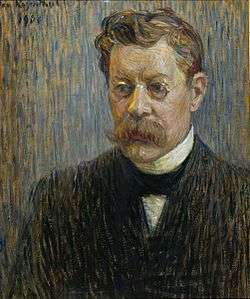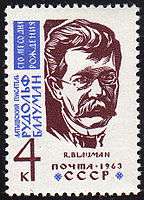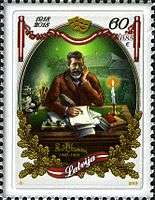Rūdolfs Blaumanis
| Rūdolfs Blaumanis | |
|---|---|
 | |
| Born |
20 December 1862 Ērgļi, Russian empire (Now Latvia) |
| Died |
4 September 1908 (aged 45) Punkaharju, Russian empire (Now Finland) |
| Occupation | Poet, Playwright, translator, journalist |
| Language | Latvian, German |
| Literary movement | Realism |
|
| |
| Signature |
 |
Rūdolfs Kārlis Leonīds Blaumanis (1862–1908) was a Latvian writer, journalist and playwright. He is considered one of the greatest writers in Latvian history and particularly a master of realism. The building of a flat in Riga that he once lived has been converted to a museum named partially in his honor, the Janis Rozentāls and Rūdolfs Blaumanis Museum.[1]
Biography
Rūdolfs Blaumanis was born at Ērgļi, Latvia on December 20, 1862. His father Matīss Blaumanis was a cook in the local manor and his mother Karlīne was a housemaid. Blaumanis started his education in a private school in the Ogre parish. He studied there until 1875. Then he traveled to Riga and started studies in a German merchant school until 1881. After graduation he started to work as a clerk in a trading enterprise. During this period he started to write his first works. First publication- a story Wiedergefunden was published in 1882 in German language newspaper Zeitung für Stadt und Land.
In 1882 he returned to his native Braki homestead and lived there until 1885. In this period he deepened his Latvian language knowledge. In 1885 he became a secretary in the Koknese manor and studied to become a steward. He spent there two years. In 1886 was published his first work in the Latvian language- poem Nakts (Night). From 1887 until 1889 he again lived in the Braki and wrote several novels in Latvian and also German languages.

In 1889 he moved to Riga and after two years started to work in editorial office of Zeitung für Stadt und Land where he wrote about Latvian cultural life. In 1890 his first play Zagļi (Thieves) was staged in Riga. In the following years several more of his plays was staged with good success. In 1892 collection of his novels was translated into Estonian and later several more of his works was published in Estonia. After father's death in 1894 he again lived in Braki homestead in his native Ērgļi parish for four years and tried to become a farmer. Later he briefly worked in the New Current's main newspaper Dienas Lapa where he published satire against romanticism. In 1898 he returned to Riga and together with Aspazija and Jānis Poruks worked in one of the biggest journals Mājas Viesis In 1900 he together with his friend Andrievs Niedra published collection of poetry.
In 1901 he moved to St.Petersburg, where he worked as journalist and editor in Latvian newspaper Pēterburgas avīzes. He led a satirical section of the newspaper. In 1904 due to the financial and health problems he returned to Latvia and until 1906 lived in Braki. In this period he wrote some of his most famous plays. He was not directly involved in the Revolution of 1905 but supported writers who were. In 1906 he again moved to Riga and started to work in the newspaper Latvija where he led satirical section. In this period he shared a flat in Riga with his close friend painter Janis Rozentāls. In 1908 his health started to decline. Due to the financial problems he was not able to undergo treatment. However several fellow Latvian writers started a fundraising campaign and in late summer with the help of painters J. Rozentals Finnish wife Blaumanis was able to go to Finland. However that was too late and he died on 4 September 1908 in the Punkaharju sanatorium for tubercular patients in Finland. He was buried in his native Ērgļi village.
His homestead in Braki has been turned into a museum and memorial.
Bibliography
Translations
- In the Lap of Happiness, Translation from the Russian by T. Zalite, Moscow, Foreign Languages Pub. House [196?] 204 p.
Tales, short stories and noveles
- "Nezāle" (1887)
- "Pērkoņa negaiss" (1887)
- "Paradīzē" (1887)
- "Aizvien lillā" (1888)
- "Spijēnos" (1888)
- "Kā vecais Zemītis pašu nelabo redzējis" (1889)
- "Raudupiete" (1889)
- "Īstā līgaviņa" (1890)
- "Stāsts par cūku, kura runājuse" (1895)
- "Laimes klēpī" (1898)
- "Purva bridējs" (1898)
- "Salna pavasarī" (1898)
- "Andriksons" (1899)
- "Nāves ēnā" (1899)
- "Mopsis jeb Nelaime Tērbatas ielā" (1900)
- "Dziru Miķelis" (1901)
- "Stulbenis" (1904)
- "Vecais cenzors" (1907)
- "Mēmais precinieks" (1907)
- "Kā Jānis mācījies par kalēju" (1907)
- "Koka krusts" (1907)
- "Velniņi"
Plays
- "Zagļi" (1891)
- "Ļaunais gars" (1892)
- "Pazudušais dēls" (1893)
- "Maija" (1893)
- "Zelta kupris" (1895)
- "Trīnes grēki" (1897)
- "Potivāra nams" (1897)
- "No saldenās pudeles" (1901)
- "Skroderdienas Silmačos" (1902)
- "Indrāni" (1904)[2]
- "Ugunī" (1905)
- "Sestdienas vakars" (1908)
Poetry
- "Tālavas taurētājs" (1902)
- "Kā zagšus"
- "Mana lūgšana"
- "Memento!"
- "Pērkons"
- "Renatus"
- "Šūpuļa dziesma"
- "Tautasdziesma"
- "Vēl tu nezini"
- "Zelta jaunība"
- "Ziedonis klāt"
- "Ziema"
Feuilleton satirical prose
- "Labāko famīliju dzejnieks" (1894)
- "Īsa pamācība mīlēšanā" (1907)
- "Jocīgi kapu uzraksti" (1907)
Memory
- House Museum for Rudolf Blaumanis "Braki" was opened in 1959.
- There is the Museum of Janis Rosenthal Rudolf Blaumanis (memorial apartment) In Riga on Alberta Street, 12.
- In Sigulda, at the crossroads of streets Darza and Parka in 1988 was built a monument by the sculptor I. Dobychin.
 "Braki"
"Braki"- Monument in Riga Park
 Postage stamp of the USSR, 1963
Postage stamp of the USSR, 1963 Postage stamp of Latvia, 2013
Postage stamp of Latvia, 2013
References
- ↑ Bousfield, Jonathan. "Janis Rozentals and Rudolfs Blaumanis Museum". Rough Guides.
- ↑ http://www.ppf.lu.lv/v.3/eduinf/skoleniem/Blaumanis/Indrani.pdf
External links
| Wikimedia Commons has media related to Rūdolfs Blaumanis. |